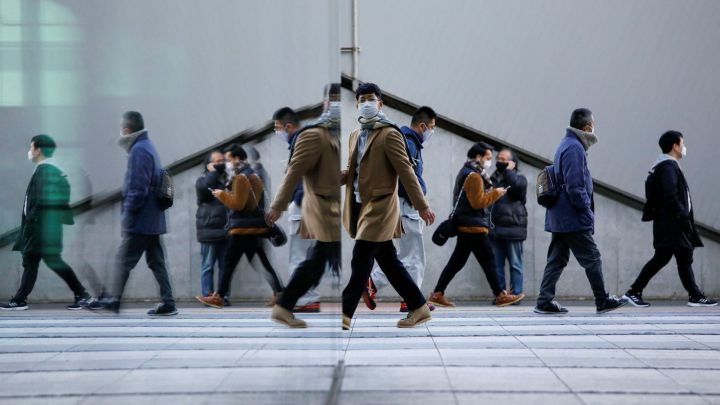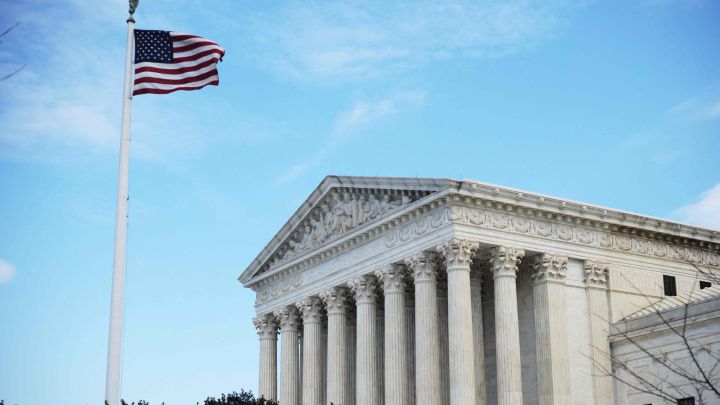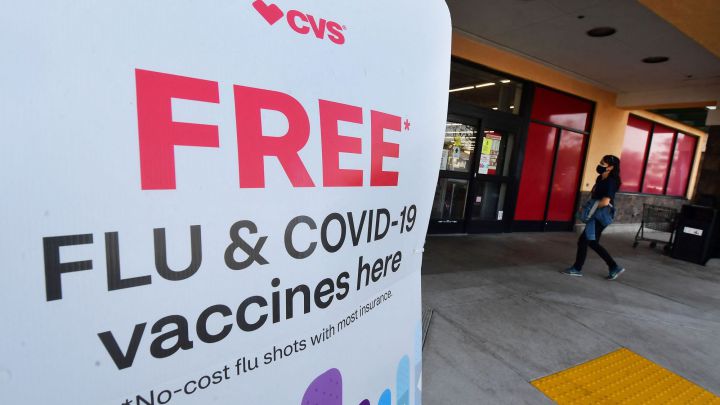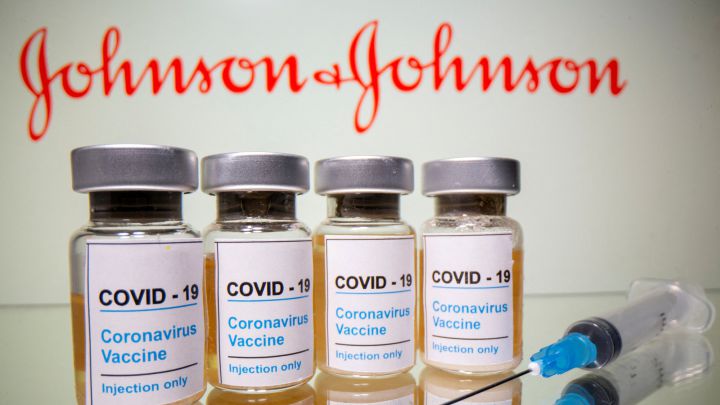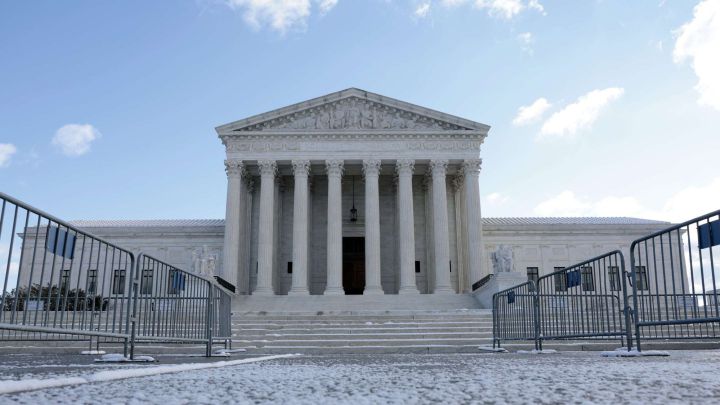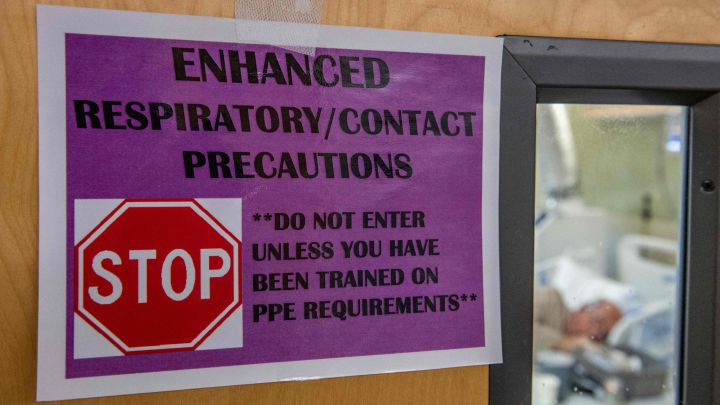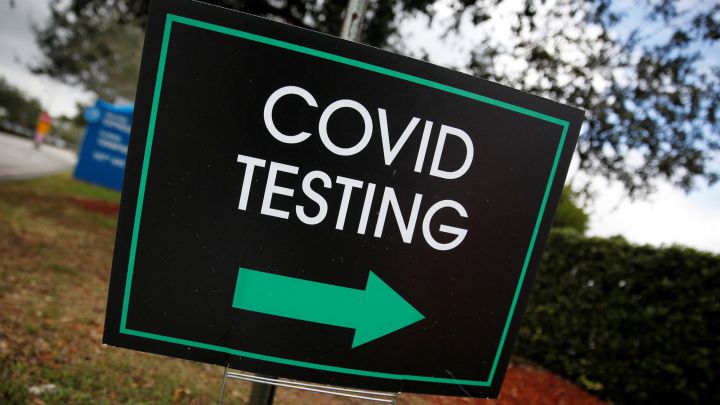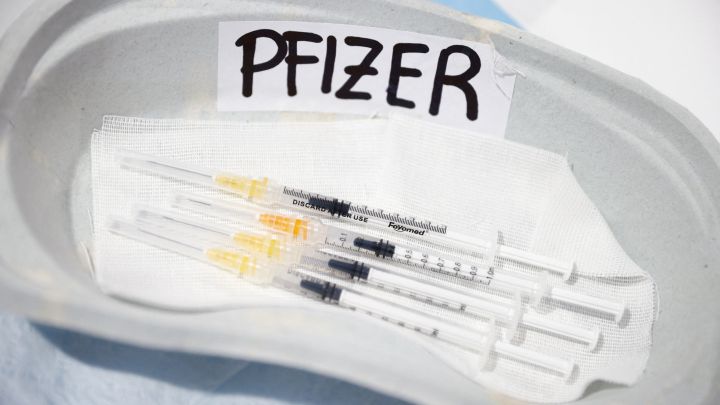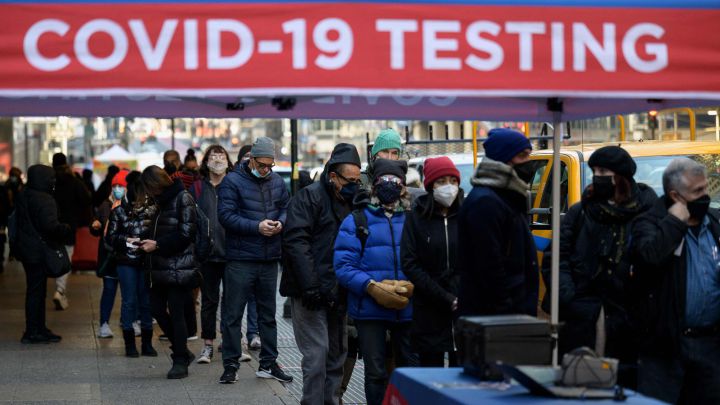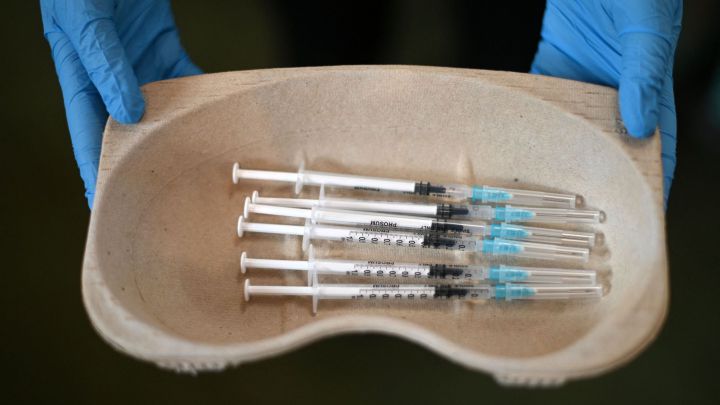Covid news summary on 16 January 2022
Latest news and information on the spread of the Omicron variant of covid-19, including updates on cases and deaths, restrictions, vaccines and boosters.
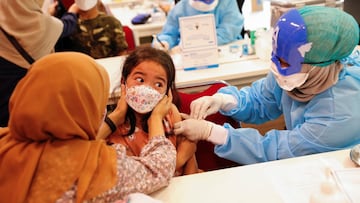
Show key events only
Omicron covid-19 variant headlines:
- New data shows many people with Omicron are contagious for more than five days
- At-home testing kits to be sent out to US households "soon" - VP Harris
- US government to purchase additional 500m at-home testing kits, taking total to 1bn - Biden
- Health officials warn that Omicron can still cause severe cases and have long-term health impacts
- Risk of catching Omicron abroad delays airline recovery
- US President Biden announces deployment of medical teams to support overwhelmed hospitals in six states
- Omicron "will find just about everybody", Dr Fauci says
- CDC confirms N95 masks are the safest
- US hospitalizations for covid-19 at record levels
- Omicron to hit US growth in early 2022
- Omicron variant accounts for over 60% of global covid-19 cases
- Quebec plans to impose 'health tax' on residents who refuse vaccine
General news and information
- Are the doses of the Moderna and Pfizer booster shots different?
- What side effects does the vaccine have on children?
- What is 'flurona' and what are the symptoms?
- Will swabbing your throat produce a more accurate result for a covid-19 rapid test?
- Is it normal to experience armpit pain after receiving the vaccine?
Key websites:
- The Centers for Disease Control and Prevention
Further reading:
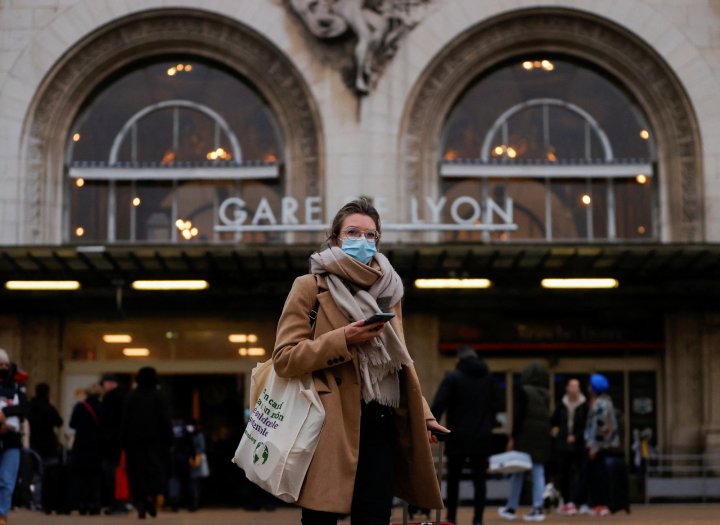
Pfizer announces 520 mln euros investment plan in France
Pfizer CEO Albert Bourla told French TV station BFM TV on Monday that Pfizer was making a 520 million euros ($593.7 million) investment plan in France over five years to help tackle Covid-19. Bourla also said that Pfizer was setting up a partnership with French company Novasep to develop an anti-Covid pill treatment.
When will the federal governmnet begin sending tests?
On January 19th, Americans can visit COVIDTests.gov and begin to order their — submit their orders. Let me repeat that: It’s COVIDTests.gov.
To ensure broad access, the program will limit the number of tests sent to each residential address to four tests.
There will be tests for every household that wants to order them.
Tests will typically ship within 7 to 12 days of ordering.
Axios reports: Many with Omicron are contagious for more than five days
In December, the CDC lowered the quarantine guidance from ten to five days after data showed that many with covid are their most contagious earlier in their infection. A new report from testing in the NBA which will undergo peer review found that a "large percentage of Omicron-infected people still had viral loads over a certain threshold five days after their first positive test."
US launches site to send tests to homes around the country
Now people in the US with private insurance will be able to get reimbersed by their insurance comapny for eight at home covid-19 tests a month. In the coming weeks more information will be released about how easy companies will make it to receive these reimbersements as daily case counts continue to rise.
When should you take a covid-19 rapid test?
Public health experts and the Centers for Disease Control and Prevention agree that Americans should consider using at-home rapid tests in the following situations: First, if they begin to have symptoms consistent with COVID; second, at least five days after close contact with someone who has COVID; and third, if someone is gathering indoors with a group of people who are at risk of severe disease or are unvaccinated.
Covid-19 death rate approaches 2,000 once again
Experts have known for weeks that the more contagious Omicron variant of covid-19 is repsonsible for the sharp rise in cases across the country but some have suggested that the newer strain is less dangerous that other variants. However while the death rate amongst the infected is indeed lower, the rapid spread of Omicron across the country has meant that the United States is once again approaching the bleak milestone of 2,000 covid-19 deaths every single day.
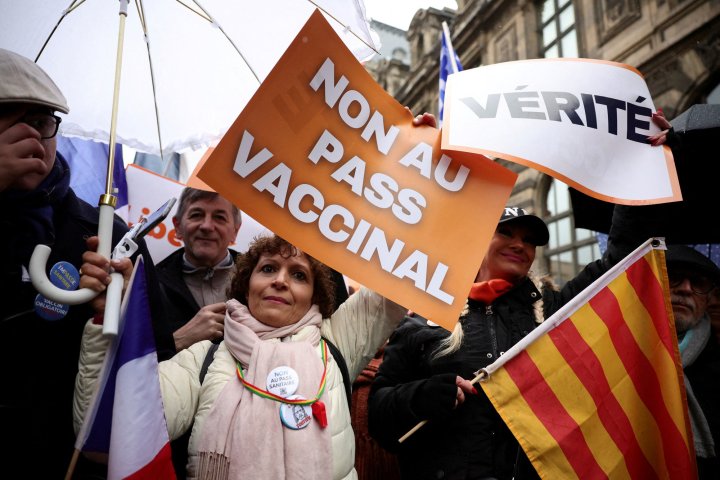
French parliament approves vaccine pass
France's parliament gave final approval on Sunday to the government's latest measures to tackle the Covid-19 virus, including a vaccine pass contested by anti-vaccine protestors. Lawmakers in the lower house of parliament voted 215 in favour to 58 against, paving the way for the law to enter force in the coming days.
The new law, which had a rough ride through parliament with opposition parties finding some of its provisions too tough, will require people to have a certificate of vaccination to enter public places like restaurants, cafes, cinemas and long-distance trains. Currently, unvaccinated people can enter such places with the results of a recent negative Covid-19 test.
Nearly 78% of the population is fully vaccinated, according to the Health Ministry on Saturday. President Emmanuel Macron, who is expected to seek a second term in an April presidential election, told Le Parisien paper this month that he wanted to 'piss off' unvaccinated people by making their lives so complicated they would end up getting the Covid vaccine.
Thousands of anti-vaccine protestors demonstrated in Paris and some other cities on Saturday against the law, but their numbers were down sharply from the week before, just after Macron's remarks. France is in the grips of its fifth Covid-19 wave with daily new cases regularly hitting record levels over 300,000. Nonetheless the number of serious cases putting people in ICU wards is much lower than the first wave in March-April 2020.
Italy reports 149,512 Covid-19 cases and 248 deaths
Italy reported 149,512 Covid-19 related cases on Sunday, after 180,426 the day before, the health ministry said, while the number of deaths fell to 248 from 308. Italy has registered 141,104 deaths linked to Covid-19 since its outbreak emerged in February 2020, the second-highest toll in Europe after Britain and the ninth highest in the world.
The country has reported 8.71 million cases to date. Patients in hospital with Covid-19 - not including those in intensive care - stood at 18,719 on Sunday, up from 18,370 a day earlier. There were 128 new admissions to intensive care units, down from 141 on Saturday. The total number of intensive care patients increased to 1,691 from a previous 1,677. Some 927,846 tests for Covid-19 were carried out in the past day, compared with 1.22 million previously, the health ministry said.
Corbevax, the patent-free Covid-19 vaccine
Texas-based microbiologist María Elena Bottazzi and her research team have developed a new Covid-19 vaccine, Corbevax. The big difference between Corbevax and the other Covid-19 vaccines currently approved for emergency use such as those developed by Pfizer and Moderna is that it is not patented - a deliberate decision.
Italian-born Bottazzi, the Associate Dean of the National School of Tropical Medicine at Baylor College of Medicine in Houston says that Corbevax is "the world’s Covid-19 vaccine."
The vaccine was developed using a similar process used to make the hepatitis B vaccine. That means that it is relatively easy to produce - and cheap, at a cost of a little over a dollar per dose.
In an interview with El Pais, Bottazzi explained how Corbevax can be produced on a large scale and why "you need to be a little more altruistic during a global pandemic. If Brazil wants to start producing it tomorrow, they have the technology, the factories and the know-how. Any manufacturer who can produce hepatitis B vaccines can produce this vaccine on a vast scale".
Why you might not want to catch Omicron
NPR - Millions of people are testing positive with covid-19 in the US each week and the FDA warns that most Americans will get the virus at some point. With growing evidence that the omicron variant likely causes milder disease, some people may be thinking: Why not encourage omicron to infect us so we can enjoy life again?
That's not a good idea for many reasons, say infectious disease experts and doctors. Don't throw your mask away and do not even think about hosting a 1970s-style chicken pox party, the omicron version.
CDC confirms N95 masks are the safest
Mask-wearing has become a fact of life in some situations during the pandemic, although health authorities have largely steered clear of recommending a specific type of mask until now.
Today the Centers for Disease Control and Prevention confirmed that the N95/KN95 variations offered the best protection for civilians and recommended their usage to help curb the spread of the more contagious Omicron variant.
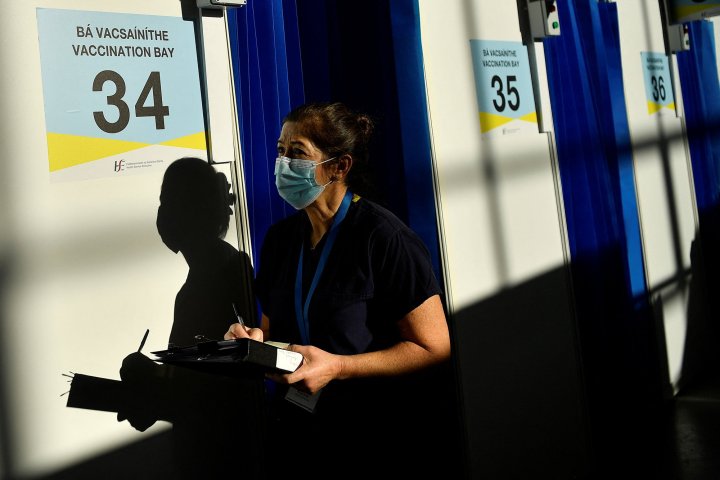
Irish hospitalisations see first week-on-week drop in Omicron cases
The number of coronavirus patients in Irish hospitals fell week-on-week for the first time since the Omicron variant drove cases to record highs last month, adding to confidence that restrictions will begin to be lifted shortly. Ministers have said this week that they are increasingly confident of being able to end curbs introduced mainly on the hospitality and entertainment industry and that they will be guided by whether or not pressure on hospitals eases.
There were 965 Covid-19 patients in hospital on Sunday, down on 984 a week ago and an Omicron peak of 1,063 last Monday, the health department said. The numbers in hospital reached a pandemic high of just over 2,000 a year ago during Ireland's deadliest wave.
Hospitalisations tend to rise faster over weekends during waves of the disease in Ireland as more discharges occur on weekdays. The proportion of patients requiring critical care has been stable throughout the Omicron wave and stood at 88 on Sunday compared to a barely manageable 221 this time last year. Case numbers have also been falling over the last week, health department data shows.
"I'm very keen to see the reopening happen at an ambitious pace over the next few weeks," Deputy Prime Minister Leo Varadkar told national broadcaster RTE ahead of a meeting of public health officials on 20 January to recommend the next move.
The government shut nightclubs and cut capacity at indoor events in early December before widening the constraints on crowds and ordering bars and restaurants to close at 8 p.m. two weeks later. Varadkar reiterated that restrictions would likely be eased on a phased basis. Previously the government has lifted the most recently imposed curbs first and further reopened the economy every two to three weeks.
Austria eyes raising age for compulsory coronavirus jabs to 18
Austria's government proposed on Sunday setting the minimum age for mandatory coronavirus vaccinations against Covid-19 at 18 and rolling out the programme in stages from 1 Februray, seeking to build broad consensus for the disputed step. The conservative-led government had said last month it intended the mandate to apply to all people aged 14 and up, the first European Union country to make vaccinations compulsory for the general population.
"This is not a fight between the vaccinated and unvaccinated," Chancellor Karl Nehammer, just emerging from quarantine after contracting Covid-19, told a news conference in Vienna a day after thousands marched against the plan. Nehammer said the government needs to press ahead because too many remain unvaccinated to allow people to mingle freely, stressing the need to avoid more lockdowns.
Nearly 72% of Austria's population has a valid vaccination certificate. Many Austrians are sceptical of vaccines, a view encouraged by the libertarian-minded, far-right Freedom Party, the third biggest in parliament. Parliament is scheduled to vote on the plan this week. Critics of vaccine mandates say that apart from the issue of personal freedoms, current jabs do not prevent viral transmission or re-infection and that the now dominant Omicron variant of the coronavirus appears to be milder, causing less serious illness, than previous variants.
Nehammer said an entry phase of mandatory inoculations would last until mid-March and give people another chance to get jabs without being fined if caught in an inspection. People who are still not vaccinated will get reminders, and in a third phase get invitations to vaccination appointments that will trigger penalties if not taken up. "In the best case we won't even need this third phase," Nehammer said. Holdouts face fines of 600 euros ($685) per violation or up to 3,600 euros in all, but not jail time, officials said.
As infections set records in the Alpine republic late last year, the government announced a fourth national lockdown and said it would make vaccinations compulsory for all. Exceptions apply for people who cannot get vaccinated for medical reasons or are pregnant. Austrian health authorities have reported more than 1.4 million infections and nearly 14,000 deaths from Covid-19 since the pandemic broke out in early 2020. The government is keen to avoid reintroducing a full lockdown like the one the country emerged from last month, its fourth of the pandemic.
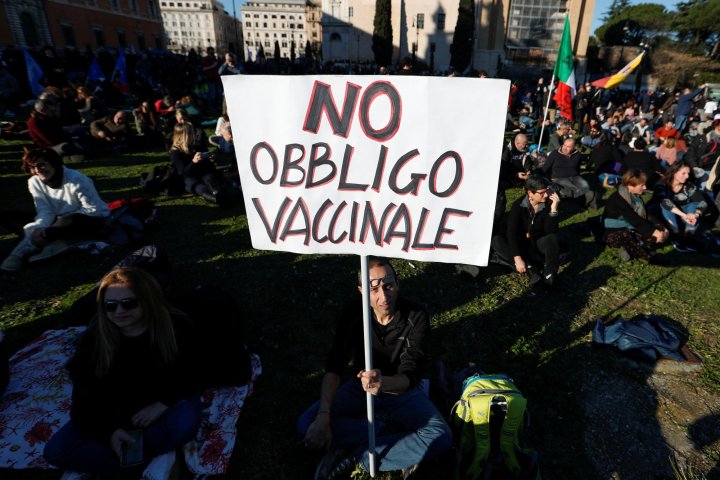
Don't discriminate against the unvaccinated, Amnesty International tells Italy
Human rights group Amnesty International urged Italy to change tough anti-Covid restrictions to avoid discrimination against unvaccinated people. In a recent decree Mario Draghi's government made vaccination mandatory for everyone over the age of 50 and for use of public transport and a range of other services, one of very few countries to take similar steps, in an attempt to ease pressure on Italian health services and reduce fatalities.
Amnesty International asked for the provision of alternative measures, including the use of masks and Covid-19 testing, to allow the unvaccinated population to continue to go to work and to use public transport 'without discrimination', the group said in a statement issued late on Saturday.
Under current rules, which will run until 15 June, wearing a mask and having a negative Covid-19 test is not sufficient to access public transportation or, for people over the age of 50, to go to their workplaces. Amnesty International Italia, the local chapter of the human rights group, said that mandatory vaccination could be justified but needed to be limited in time and 'proportionate' to a legitimate aim of public health protection. 'The government must continue to ensure that the entire population can enjoy its fundamental rights, such as the right to education, work and medial treatment, with particular regard to non-Covid patients who need urgent surgery,' it said.
The fast-spreading covid-19 Omicron variant has pushed new infection rates sky-high leaving researchers scrambling to unlock its secrets. So far, evidence suggests that the strain that was first discovered in mid-November causes less severe illness than the Delta variant, but it is still dangerous.
Much of the knowledge on Omicron has come from observations of those who have been infected but there are still no scientific studies. Although the virus behaves somewhat differently to prior covid-19 variants, health experts warn that people should assume that Omicron too can cause long covid until proven otherwise.
Quebec's unvaccinated people rush to get jab to avoid health tax
Vaccine appointments in Quebec have shot up in the 48 hours under the thrreat of plans to place a health tax on those who haven't had the jab. Health Minister Christian Dubé described the uptake as "encouraging" in a tweet. Last week, Quebec Premier François Legault outlined plans for a “significant” financial penalty on those who refuse the Covid-19 vaccine - except those with medical exemptions. The measure will be voted on in parliament at the start of next month.
Omicron isolation hampers public services
Less than a month ago the Centers for Disease Control and Prevention (CDC) announced that it was lowering the isolation period for positive covid-19 cases to just five days, a move partially in response to the huge numbers of people being forced to stay at home. However, despite this effort it seems that workers' absences are being felt in many industries, most recently the garbage and recycling collection services.
If you or someone you know is suffering from armpit pain after receiving a covid-19 vaccine or booster shot here’s what you need to know.
Armpit pain is a recognised side effect of the Moderna and Pfizer -BioNTech covid vaccines - the ones that use mRNA (messenger RNA) technology. While it can be painful it is usually entirely normal and generally does not require medical intervention.
This reaction was seen during the trials of both Moderna and Pfizer -BioNTech vaccines and is a normal reaction of the immune system. Because of this doctors are keen to allay fears about armpit pain reactions and avoid unnecessary testing or treatment for something that will resolve by itself in a short period of time.
According to the New York Times, 11.6% of patients in the Moderna study had such a reaction after the first dose and 16% after the second, while with the Pfizer-BioNTech there was a lower reported rate, at only 0.3% of participants.
The Omicron variant has brought about a rapid increase in case numbers in recent weeks with the United States surpassing one million cases per day for the first time in the pandemic. The more contagious strain is thought to be better at evading vaccine immunity, but Bill Gates has suggested that the latest wave of infections could actually represent the start of a return to normality.
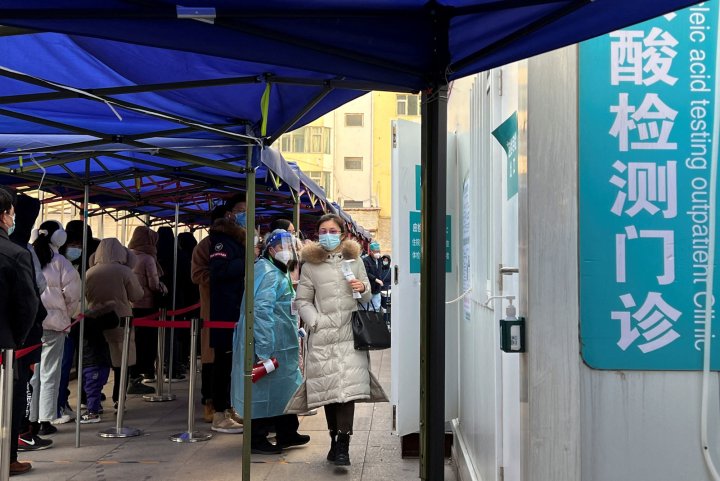
Beijing Omicron outbreak prompts temple closures
China reported 65 locally transmitted Covid-19 cases for 15 January, including the first Omicron case in Beijing, just weeks from the start of the city's Winter Olympic Games on 4 February and the country's Lunar New Year holiday. That was down from 104 comparable cases a day earlier, as the outbreak in the northwestern city of Xian winds down after strict lockdowns. But the highly transmissible Omicron variant has been detected in at least five provinces and municipalities, prompting cities to impose curbs to stop its spread and threatening to further undercut slowing economic growth.
On Saturday, the capital Beijing reported the first local infection of the Omicron variant, involving a person who had visited multiple malls and restaurants in the previous 14 days. The person had not left the city since the start of this year. China has not said how many Omicron cases it has detected in total. About 13,000 people have been tested for Covid-19 in the Haidian district where the case was discovered, but none of the results came back positive, Beijing Daily, a government newspaper, cited official data as saying on Sunday. However, some religious sites in the city were already being closed to visitors as a precautionary measure. Lama Temple, a Tibetan Buddhist monastery in central Beijing, said on Sunday it was closing down for an unspecified period due to Covid-19 epidemic and control measures.
"It is too soon to conclude that Omicron will swamp China's efforts to suppress Covid," said Mark Williams, chief Asia economist at Capital Economics, in a note issued on Friday. "But it is clear that the emergence of more transmissible variants is requiring more frequent interventions ... And the economic toll from this vigilance is mounting."
Mainland China reported 119 new confirmed Covid-19 cases for 15 January, including imported infections, down from 165 a day earlier, according to National Health Commission (NHC) data on Sunday. The new locally transmitted cases were in Tianjin, Henan, Beijing, Guangdong and Shaanxi, NHC said. There were no new deaths, leaving the death toll at 4,636. As of 15 January, mainland China had 104,864 confirmed cases.
Good morning and welcome to our live blog for Sunday 16 January 2022, covering the latest news on the spread of the Omicron variant of Covid-19, with a particular focus on the situation in the United States.
- PCR
- Joseph Biden
- Anthony Fauci
- Washington D.C.
- Pfizer
- Moderna
- Science
- Coronavirus Covid-19
- Pharmaceutical industry
- Vaccines
- Pandemic
- Coronavirus
- United States
- Pharmacy
- Vaccination
- Virology
- Outbreak
- Infectious diseases
- North America
- Preventive medicine
- Microbiology
- Diseases
- Medicine
- America
- Enterprises
- Economy
- Health
- Biology
- Industry
- Life sciences
